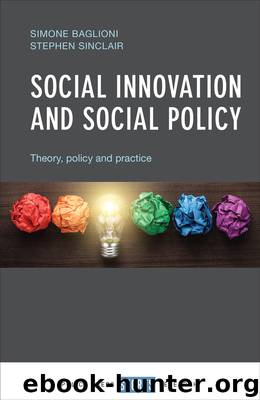Social innovation and social policy by Simone Baglioni & Stephen Sinclair

Author:Simone Baglioni & Stephen Sinclair
Language: eng
Format: epub
Publisher: Policy Press
Conclusions
Food poverty has become a policy concern in many higher-income countries, as global political and socioeconomic changes in employment, households and population structures have challenged the wellbeing of large sections of the population. In many such countries there is no tradition of large-scale public action to address food security, as undernourishment was previously considered a marginal problem which was addressed by general welfare policies or private philanthropy. However, more recently there has been much greater civil society activity in developing responses to address unmet nutritional needs and to call for more effective public policy responses. Starting from the seemingly simple idea of collecting surplus food and redistributing it to those in need, social innovations have generated a plethora of innovative partnership with private companies, ranging from local to national programmes. These social innovations have not only aimed at meeting food and related needs, they have also supported the social integration of people in very challenging circumstances, such as the long-term unemployed, low-income households, homeless people, asylum seekers, refugees and migrants.
These social innovations have been made possible by three related innovations. First, the innovation of CSOs developing models and systems to collect and distribute surplus food. Second, policy innovation produced by inter-sectoral cooperation between actors with different aims and ideas, in particular, partnerships between food companies, not-for-profit civil society organisations and public authorities. Finally, CSOs have been innovative in how they deal with service users to protect their dignity and personal integrity. This chain of innovations has led in turn to various policy reforms. These include significant policy innovations, such as the case of France, which introduced a legal obligation to donate surplus food. Milder reforms include measures to support surplus food donation by refining fiscal or tax liabilities, waste disposal and health and safety regulations, and conditions relating to volunteering.
These social innovations address needs not met by existing public provision. Consequently, it is not possible to assess whether they offer more responsive and/or cost-effective provision than statutory or conventional services. The quality of their provision generally seems high, but a more fundamental fact is that they exist at all, addressing a need where public provision is absent or inadequate. In addition, these social innovations reach populations who, in many cases, are not full citizens, either legally (as in the case of asylum seekers) or because they may be described as suffering the partial citizenship of social exclusion. In this respect, these social innovations expand the boundaries of welfare and citizenship. Hunger and undernourishment are basic deprivations and reducing such destitution is clearly a benefit that these social innovations provide. However, beyond meeting such essential needs and fulfilling a fundamental human right, these social innovations also benefit and empower both users and volunteers by offering care, expressing solidarity, and providing them with opportunities for social interaction and engagement (Garthwaite, 2016). Many of these social innovations cooperate closely with public welfare institutions. For example, many of those who receive food from social innovations are referred to them by public authorities. Social innovations
Download
This site does not store any files on its server. We only index and link to content provided by other sites. Please contact the content providers to delete copyright contents if any and email us, we'll remove relevant links or contents immediately.
The Secret History by Donna Tartt(19051)
The Social Justice Warrior Handbook by Lisa De Pasquale(12187)
Thirteen Reasons Why by Jay Asher(8893)
This Is How You Lose Her by Junot Diaz(6877)
Weapons of Math Destruction by Cathy O'Neil(6264)
Zero to One by Peter Thiel(5786)
Beartown by Fredrik Backman(5737)
The Myth of the Strong Leader by Archie Brown(5498)
The Fire Next Time by James Baldwin(5431)
How Democracies Die by Steven Levitsky & Daniel Ziblatt(5213)
Promise Me, Dad by Joe Biden(5141)
Stone's Rules by Roger Stone(5081)
A Higher Loyalty: Truth, Lies, and Leadership by James Comey(4952)
100 Deadly Skills by Clint Emerson(4920)
Rise and Kill First by Ronen Bergman(4779)
Secrecy World by Jake Bernstein(4740)
The David Icke Guide to the Global Conspiracy (and how to end it) by David Icke(4701)
The Farm by Tom Rob Smith(4502)
The Doomsday Machine by Daniel Ellsberg(4484)
